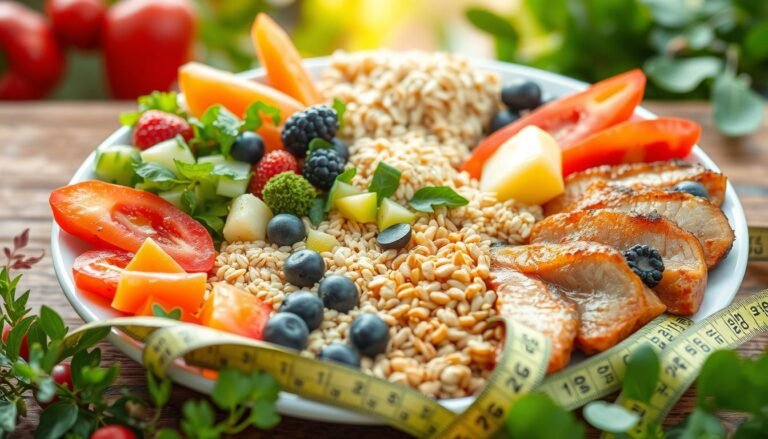Figuring out your ideal calorie intake is key for losing weight. It starts with knowing your basal metabolic rate (BMR). For American women, the average BMR is about 1,400 calories1. It’s important to understand how many calories you need each day to fit your lifestyle and goals.
The Harris-Benedict formula helps estimate your BMR. It looks at your gender, age, and body size.

Basal metabolic rate (BMR) is the energy needed for basic body functions, even when you’re resting. A common idea is that losing 3,500 calories equals losing 1 pound (lb) of body weight. But, research shows this might not always be true.
For women, it’s best to eat at least 1,200 to 1,300 calories a day2. Eating less than 1,200 calories a day can be risky. It might lead to gallstones, fatigue, and malnutrition.
Key Takeaways
- Calculating your ideal calorie intake is essential for effective weight loss
- Understanding your basal metabolic rate (BMR) is key to figuring out your daily calorie needs
- A minimum caloric intake is recommended for women and men to avoid health risks
- Activity level and biological sex affect how many calories you need
- Online calculators can help estimate your daily calorie needs and track your calorie intake and expenditure
- Calorie needs usually go down with age because of less activity, muscle loss, and lower metabolic needs
Understanding the Basics of Calorie Requirements
To get the right amount of energy, knowing about calorie needs is key. Calories measure the energy in food and drinks3. The amount you need changes based on your age, sex, weight, and how active you are. For instance, women usually need 1,600 to 2,400 calories a day, while men need 2,000 to 3,000.
Basal metabolic rate (BMR) is a big part of your daily calorie use, making up about 60%. BMR is around 1,400 to 1,500 calories for women and 1,600 to 1,800 for men. To figure out your calorie needs, you must consider your height, weight, age, sex, and how active you are4.
Here are some examples of daily calorie needs:
- Children (2-3 years): 1,000 calories daily
- Active adult males (19-30 years): 2,400-2,600 calories
- Active adult females (19-30 years): 1,800-2,000 calories
Knowing your calorie needs is important for staying healthy. By looking at your own factors and using tools like the Mifflin-St-Jeor equation, you can find your best energy intake. This helps you make a plan to reach your weight goals.
Factors Affecting Your Ideal Calorie Intake
Several factors influence your ideal calorie intake, including age, sex, weight, height, and activity level. For example, a young, active adult needs more calories than an older, less active person. Knowing these factors is key to finding your ideal calorie intake and planning for weight loss. Calorie needs peak at about age 25 and then decline by about 2% every 10 years5.
Sex also affects calorie needs. Adult men generally have more muscle than women of the same size and age. This means men usually need about 5 to 10% more calories than women, except during pregnancy and breastfeeding. To estimate Basal Metabolic Rate (BMR), multiply a woman’s weight by 10 and a man’s weight by 11.
Genetic factors and inherited metabolic diseases, like thyroid issues, can also impact calorie needs. More muscle means a higher metabolism and more calorie burn compared to those with more body fat. Activity levels also play a role, with some exercises burning calories even after you stop. Keeping a balanced daily calorie intake is vital for a healthy weight. Understanding these factors helps you find your proper caloric intake.
Calculating Your Basal Metabolic Rate (BMR)
To find out the ideal calorie intake, you need to know your Basal Metabolic Rate (BMR). This is about 70% of your daily calorie use6. BMR is the calories needed for basic body functions like breathing and blood flow.
There are a few ways to figure out your BMR. The Mifflin-St Jeor equation is more precise. It uses your age, sex, weight, and height. For example, a 35-year-old male who is 200 pounds and 6 feet tall needs about 1,882 calories a day7.
After finding your BMR, you can adjust it for how active you are. This is done by multiplying your BMR by an activity factor. This factor goes from 1.2 for those who don’t move much to 1.9 for the very active. Let’s say your BMR is 1,800 calories and you’re moderately active. You might need to add 200-300 calories to your daily total.
Remember, BMR calculators don’t consider your health needs. They should be used carefully. Also, a higher or lower BMR doesn’t mean you’re healthier or sicker. Many things can affect your metabolic rate.
Determining Your Total Daily Energy Expenditure
To keep the ideal calorie intake, you need to know your Total Daily Energy Expenditure (TDEE). This is the total calories your body burns each day8. It includes your Basal Metabolic Rate (BMR), how your body uses food, and your activity level. Knowing your TDEE helps you set a good calorie goal for losing weight.
There are ways to figure out your TDEE. You can use online tools or keep a food diary to track your calories9. The Mifflin-St. Jeor formula is another method. It uses your weight, height, and age to calculate your BMR for men and women. For instance, if your TDEE is 2,500 calories a day and you want to lose weight, you might need to eat 2,000 calories daily.
Several things can change your TDEE:
- Basal Metabolic Rate (BMR)
- Activity level
- Thermic effect of food (TEF)
Your TDEE changes every day, unlike BMR, which stays the same10. To keep a healthy calorie intake, it’s key to know your TDEE and adjust your calorie intake.
Setting Your Ideal Calorie Intake for Weight Loss
To lose weight, you need to eat fewer calories than you burn. A good goal is to cut 500-1000 calories a day. This can lead to losing 1-2 pounds each week11. It’s important to adjust your calorie intake to match your weight loss goals.
If you aim to lose 10 pounds in 10 weeks, you’ll need to cut 500 calories daily. Your daily calorie needs depend on your age, sex, and how active you are. Adults need between 1,600 to 3,000 calories a day, with women needing less than men12.
To safely lose weight, you can eat less or move more. Cutting 500 calories a day can help you lose 1 pound weekly. Adding more physical activity also burns calories and helps reach your goals. By finding the ideal calorie intake and creating a deficit, you can lose weight and stay healthy.
Common Mistakes When Calculating Calorie Needs
Figuring out the right proper caloric intake is key for losing weight. Yet, many people make errors that slow down their progress. One big mistake is not adjusting for how active you are. This can make your daily calorie needs way off13.
Also, people often don’t tell the truth about how many calories they eat. About 99% of folks lie about their calorie intake.
Not taking into account your metabolism and body type is another error. This can lead to eating too little or too much, making weight loss hard. For instance, forgetting about liquid calories can add 2,300 extra calories a month. That’s about 8 pounds of weight gain each year.
Setting calorie budgets by meal instead of by day is also a mistake. This can mean eating 100 calories less for the whole day14.
To steer clear of these errors, it’s vital to track your calorie intake accurately. Use a food diary or a calorie tracking app to keep an eye on your daily calories. By avoiding these common mistakes and keeping a balanced daily calorie intake, you can reach your weight loss goals and live a healthy life.
Adapting Your Calorie Intake Over Time
As you move forward in your weight loss journey, it’s key to tweak your calorie intake. This helps avoid plateaus and keeps you on track to reach your goals. If you notice your weight loss slowing down, it might be time to cut back on calories.
For instance, if you’ve been eating 1,500 calories a day but aren’t losing weight anymore, try dropping to 1,200 calories. This can help you keep losing weight.
Signs you might need to adjust your calories include seeing less weight loss or hitting a plateau. To break through a plateau, you could try exercising more or tweaking your diet’s macronutrients. Also, remember that losing weight can mess with your hunger and fullness hormones. This might make you hungrier and less full.
Regularly adjusting your calorie intake can keep you on the right path to your weight loss goals.
Some important things to think about when changing your calorie intake include:
- Keep an eye on your weight loss and adjust your calories as needed18
- Boost your metabolism and support weight loss by increasing physical activity19
- Make sure you’re getting the right mix of protein, fat, and carbs17
By tweaking your calorie intake and using strategies to break through plateaus, you can overcome challenges and reach your weight loss goals. Always aim for the ideal calorie intake and healthy calorie consumption for your overall health and well-being.
Maintaining Nutritional Balance Within Your Calorie Goal
To keep your calorie intake balanced, focus on the nutritional value of your food. Eat a variety of foods like fruits, vegetables, whole grains, lean proteins, and healthy fats. This helps meet your calorie needs and keeps your body healthy20. For example, if you aim for 1,800 calories a day, split it into 45% carbs, 30% protein, and 25% fat21.
A balanced diet is key for your health and weight goals. The right calorie amount and nutrient mix helps keep your weight healthy and lowers disease risk. Don’t forget to drink lots of water all day.
Here are some tips for nutritional balance: * Eat at least five portions of fruits and vegetables a day * Include whole grains, lean proteins, and healthy fats in your meals * Cut down on empty calories from sugary drinks and snacks * Drink plenty of water all day
By following these tips, you can reach your weight goals and boost your health and well-being.
Conclusion: Making Your Calorie Goals Work for You
Creating a calorie goal and tracking your progress is key for weight loss. Knowing your ideal calorie intake and adjusting it helps you reach your health goals. This way, you keep your diet balanced and nutritious23.
But, remember, calorie consumption is only part of the story. Just focusing on calories can cause nutrient imbalances. It can also lead to feelings of guilt or anxiety around food.
The best approach is to find a method that fits you. This might include calorie tracking, mindful eating, and eating whole, nutrient-rich foods. By finding the right balance, you can meet your weight loss goals and develop a healthier relationship with food.
Consistency and patience are essential. Stick to your calorie goals but be ready to make changes as needed. With the right mindset and tools, you can make your calorie goals work for you. This will lead to a healthier, happier you.
FAQ
What is the ideal calorie intake for weight loss?
Finding your ideal calorie intake is key for losing weight. First, figure out your basal metabolic rate (BMR). Then, adjust it based on how active you are. Aim for a 500-1000 calorie deficit each day to lose 1-2 pounds weekly.
What are calories and why do they matter for weight loss?
Calories measure the energy in food and drinks. Knowing about calories is vital for losing weight. It helps you eat fewer calories than you burn, leading to weight loss.
What factors affect my ideal calorie intake?
Several things influence your ideal calorie intake. These include your age, sex, weight, height, and how active you are. Knowing these helps you set a good calorie goal for losing weight.
How do I calculate my basal metabolic rate (BMR)?
Your BMR is your daily calorie needs. There are formulas like the Mifflin-St Jeor and Harris-Benedict equations. You can also use online BMR calculators to estimate it.
What is my total daily energy expenditure (TDEE)?
Your TDEE is the total calories your body burns daily. It includes your BMR, the energy from food, and your physical activity. Knowing your TDEE is important for a weight loss plan.
What are common mistakes when calculating calorie needs?
Mistakes include not adjusting for activity level and ignoring your metabolism and body composition. These errors can lead to an incorrect calorie estimate.
How do I adjust my calorie intake over time?
As you lose weight, your calorie needs may change. It’s important to adjust your intake to avoid plateaus. If you stop losing weight, try increasing activity or changing your diet.
How do I maintain nutritional balance within my calorie goal?
Eating a variety of nutrient-rich foods is key. Include fruits, veggies, whole grains, lean proteins, and healthy fats. This keeps you healthy and helps with weight loss.



